Letter Of Notification To Landlord
[Your Name]
[Your Address]
[City, State, Zip Code]
[Email Address]
[Phone Number]
[Date]
[Landlord's Name]
[Landlord's Address]
[City, State, Zip Code]
Subject: Notice of Intent to Vacate
Dear [Landlord's Name],
I hope this letter finds you well. I am writing to formally notify you of my intention to vacate the rental property located at [rental property address] on or before [date you plan to move out]. As per the terms of our lease agreement, this letter serves as a [number of days specified in the lease agreement, usually 30 days] notice of my departure.
I have thoroughly enjoyed my time as a tenant in your property and appreciate your prompt attention to maintenance issues and other concerns during my stay. However, due to personal circumstances, I find it necessary to seek alternative housing arrangements.
Please find below the details of my notice:
Tenant's Name: [Your Full Name]
Rental Property Address: [Rental Property Address]
Move-Out Date: [Date you plan to move out]
As per our lease agreement, I understand that I am responsible for leaving the property in a clean and well-maintained condition. Therefore, I will ensure that the premises are thoroughly cleaned, and any damages beyond normal wear and tear are repaired before the move-out date.
Additionally, I kindly request you to schedule a move-out inspection to assess the condition of the property together. This will give us an opportunity to address any potential issues before I leave and to avoid any misunderstandings regarding the security deposit refund.
Please inform me of your preferred date and time for the inspection, and I will do my best to accommodate it.
Lastly, I would like to discuss the return of my security deposit. Kindly provide me with the details of the procedures for returning the deposit, and if there are any specific forms I need to complete, please let me know.
Thank you for your understanding and cooperation throughout my tenancy. If there are any documents or processes I need to complete in relation to my move-out, please let me know, and I will ensure they are taken care of promptly.
If you have any questions or need further information, please feel free to contact me at [Your Phone Number] or [Your Email Address].
Once again, thank you for being a great landlord, and I wish you all the best in finding a new tenant for the property.
Sincerely,
[Your Full Name]
[Your Signature (if sending a physical letter)]
Letter of Notification to Landlord for Moving Out
Subject: Notice of Intent to Vacate
Dear [Landlord’s Name],
I am writing to formally notify you that I will be vacating the premises at [Your Address] on [Move-Out Date], in accordance with the lease agreement requiring [Number of Days] days’ notice.
Please let me know the procedure for the final inspection and returning the keys. I would also like to confirm how and when my security deposit will be refunded. I will ensure the apartment is left in good condition.
Thank you for your support and understanding during my tenancy.
Sincerely,
[Your Name]
Email to Landlord for Rent Increase Objection
Subject: Concern Regarding Proposed Rent Increase
Hello [Landlord’s Name],
I received your notice about the upcoming rent increase. While I appreciate your efforts in maintaining the property, I would like to request reconsideration of the amount, as it presents a significant financial strain.
I have been a responsible tenant, paying rent on time and taking good care of the property. I hope we can discuss an arrangement that works for both of us.
Kind regards,
[Your Name]
Message to Landlord About Repairs Needed
Subject: Repair Request for [Issue]
Hi [Landlord’s Name],
I wanted to let you know that the [describe issue: leaking faucet, broken heater, etc.] needs attention. It has become difficult to manage, and I would appreciate it if repairs could be scheduled soon.
Please let me know when a maintenance person can come by. Thanks in advance!
Best,
[Your Name]
Letter to Landlord for Subletting Approval
Subject: Request for Subletting Permission
Dear [Landlord’s Name],
I am writing to request your approval to sublet my apartment at [Address] for the period of [Start Date] to [End Date]. I will ensure that the subtenant adheres to all lease obligations and will remain responsible for the property.
The prospective subtenant, [Subtenant’s Name], has been vetted and is financially reliable. I am happy to provide references and background checks if required.
I look forward to your confirmation.
Sincerely,
[Your Name]
Quick Email to Landlord About Late Rent Payment
Subject: Late Rent Payment
Hi [Landlord’s Name],
I wanted to inform you that my rent for this month will be a few days late due to [brief reason]. I will make the payment by [Date]. I apologize for the inconvenience and appreciate your understanding.
Thank you,
[Your Name]
Letter to Landlord for Lease Renewal
Subject: Request to Renew Lease
Dear [Landlord’s Name],
I would like to express my interest in renewing my lease for the property located at [Address]. My current lease is set to expire on [Date], and I would be happy to extend it for another [duration].
I enjoy living here and have been pleased with the property and your management. Please let me know the terms for renewal so we can finalize the agreement.
Sincerely,
[Your Name]
Funny Message to Landlord About Noisy Neighbors
Subject: The Midnight Drummers Upstairs
Hi [Landlord’s Name],
I think my upstairs neighbors may be preparing for a world tour as professional drummers—they practice every night at midnight! While I admire their dedication, it’s making sleep a real challenge.
Could you kindly address this issue with them? I’d appreciate any help in restoring a little peace and quiet.
Thanks,
[Your Name]
Letter of Notification to Landlord About Job Relocation
Subject: Lease Termination Due to Relocation
Dear [Landlord’s Name],
I regret to inform you that I must terminate my lease at [Address], as I have been relocated for work to [New City]. My last day in the unit will be [Date], as per the required notice period.
I will ensure that the property is cleaned and all obligations are met before departure. Please advise regarding the security deposit and move-out procedures.
Thank you for your cooperation.
Sincerely,
[Your Name]
Email to Landlord About Safety Concern
Subject: Urgent Safety Concern at [Address]
Dear [Landlord’s Name],
I am writing to notify you of a serious safety issue: [describe issue, e.g., exposed wiring, broken lock, gas smell]. This poses a risk to residents and requires immediate attention.
Please let me know as soon as possible when this will be addressed. Safety is a top priority, and I trust you will act quickly.
Sincerely,
[Your Name]
What is a Letter of Notification to Landlord and Why Do You Need It?
A letter of notification to a landlord is a formal or informal message sent by a tenant to provide important information. It can be about moving out, requesting repairs, objecting to rent increases, or any matter that requires official communication. The purpose is to create a written record, maintain transparency, and ensure both landlord and tenant remain on the same page.
Who Should Send a Notification Letter to the Landlord?
These letters are always sent by the tenant or someone living in the property. In some cases, it could be a family member of the tenant or a legal representative (e.g., in case of illness or relocation for work). The sender must always have a direct connection to the tenancy.
When Should You Notify Your Landlord?
You should send a notification letter in various scenarios, including:
- Before moving out or terminating a lease
- When requesting urgent or non-urgent repairs
- To ask for approval for subletting
- When reporting safety issues
- To explain late rent payment
- For lease renewal discussions
- To raise complaints about neighbors or building concerns
- When disputing rent increases
- If relocating for work or personal reasons
Requirements and Prerequisites Before Sending
- Check your lease agreement for notice periods and rules.
- Gather details like move-out dates, issues to report, or documents to attach.
- Ensure your landlord’s contact details are correct.
- Decide on the tone: formal for legal matters, casual for minor issues.
- Have a copy of the letter or email saved for your own records.
Formatting a Notification Letter to a Landlord
- Keep the letter clear and polite.
- Use short paragraphs for readability.
- Subject line should summarize the purpose.
- Formal issues like moving out or legal notices require a professional tone.
- Casual updates (like repair requests) can be more relaxed.
- Stick to one page if printed or a few short paragraphs if emailed.
- Always end with a polite closing.
After Sending a Notification Letter: Follow-Up Steps
- Wait for confirmation from the landlord.
- If no reply is received, follow up after a few days.
- For repairs or safety concerns, request a timeline.
- For lease termination, prepare for inspection and key return.
- Keep all communication records in case of disputes.
Pros and Cons of Writing a Notification Letter to Your Landlord
Pros:
- Creates a documented record.
- Helps avoid misunderstandings.
- Shows professionalism and responsibility.
- Useful in case of legal disputes.
Cons:
- May feel too formal for small issues.
- Could escalate tensions if written in the wrong tone.
- Requires effort to draft and send properly.
Common Mistakes to Avoid in Notification Letters
- Forgetting to include dates or deadlines.
- Using aggressive or emotional language.
- Not keeping a copy for personal records.
- Sending the letter too late, violating notice requirements.
- Addressing the letter to the wrong person or office.
Elements and Structure of a Good Notification Letter
- Clear subject line or heading
- Proper greeting (formal or casual as needed)
- Body with details: what, why, when
- Any attachments (if needed, like sublet agreements)
- Polite closing with contact info
- Signature (typed or handwritten for letters)
Tricks and Tips for Writing Notification Letters
- Always write as if the letter could be used in a legal context.
- Be polite but firm in your request.
- Break information into short, clear sentences.
- Use humor only in lighthearted situations, not serious ones.
- Proofread before sending.
- Send by email for speed, or by letter when required for legal proof.

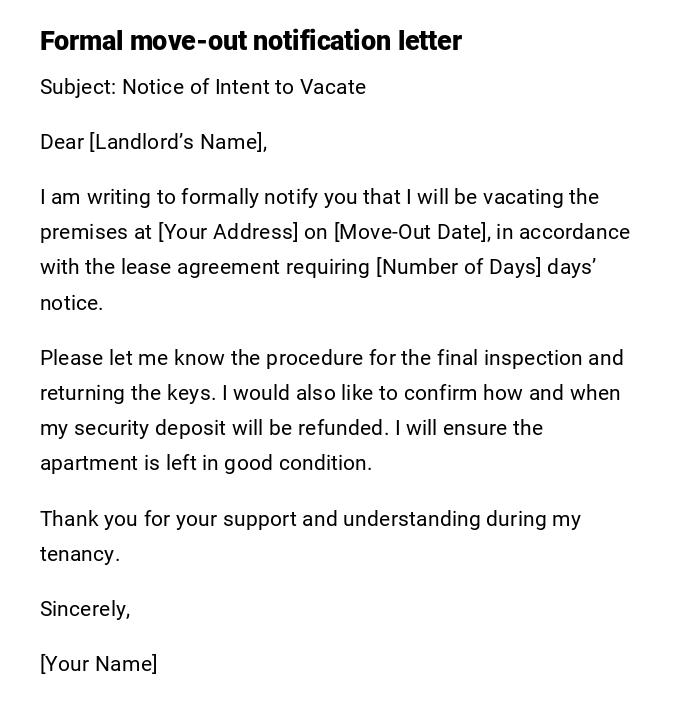
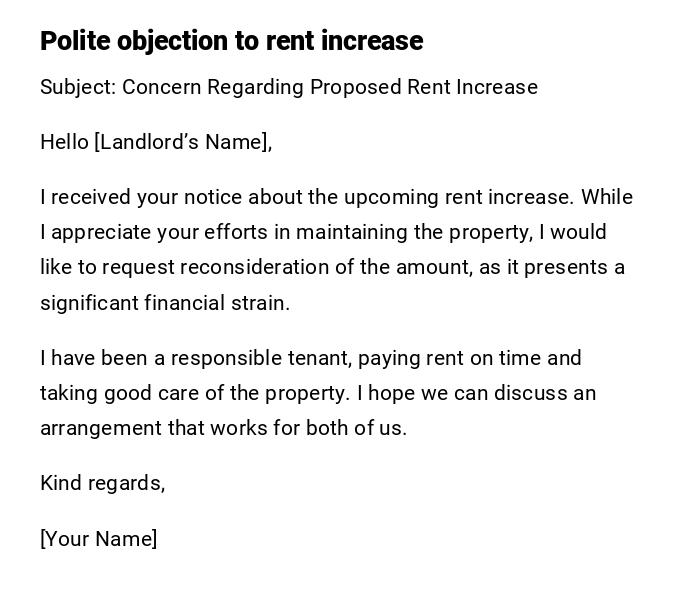
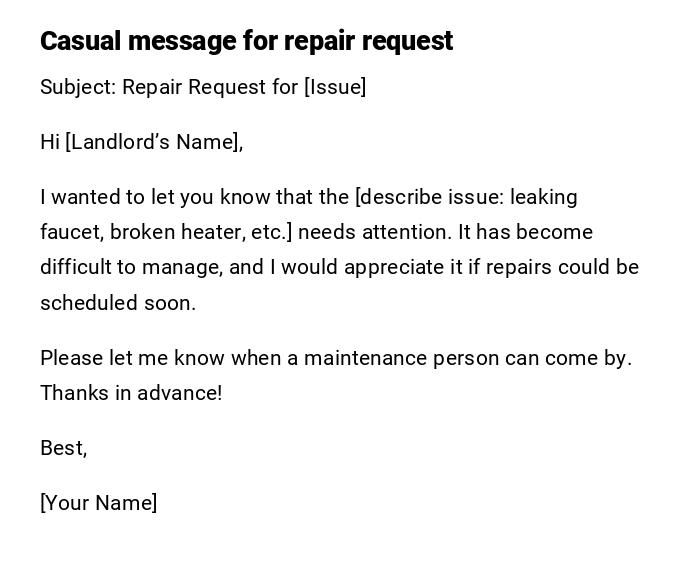
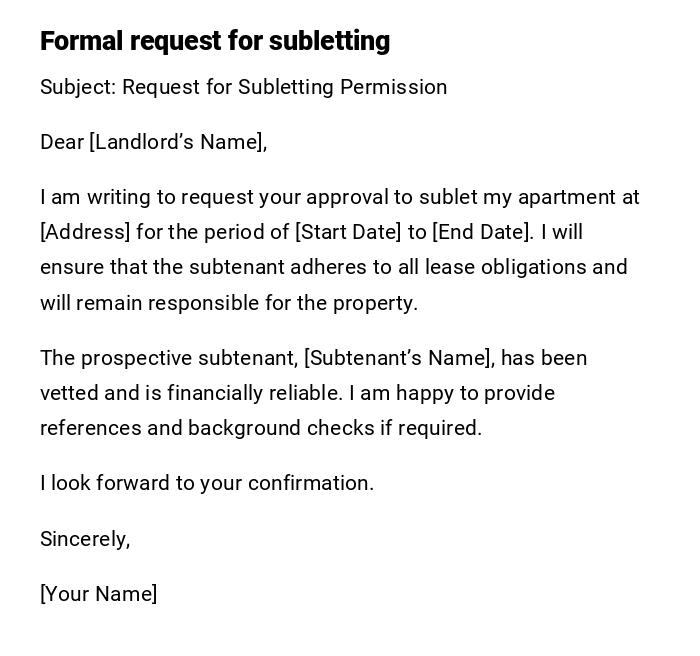
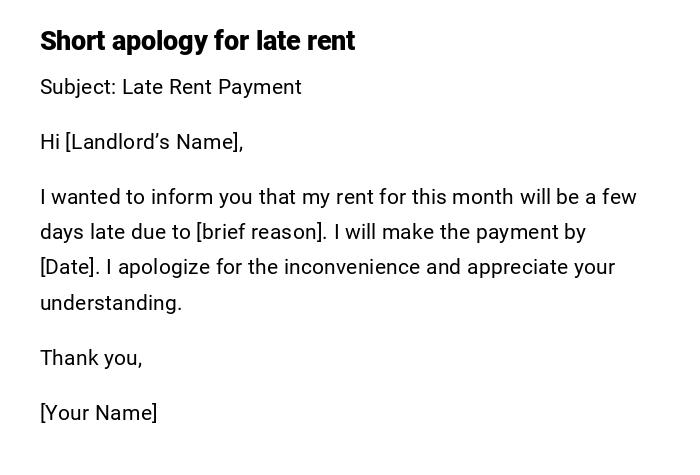
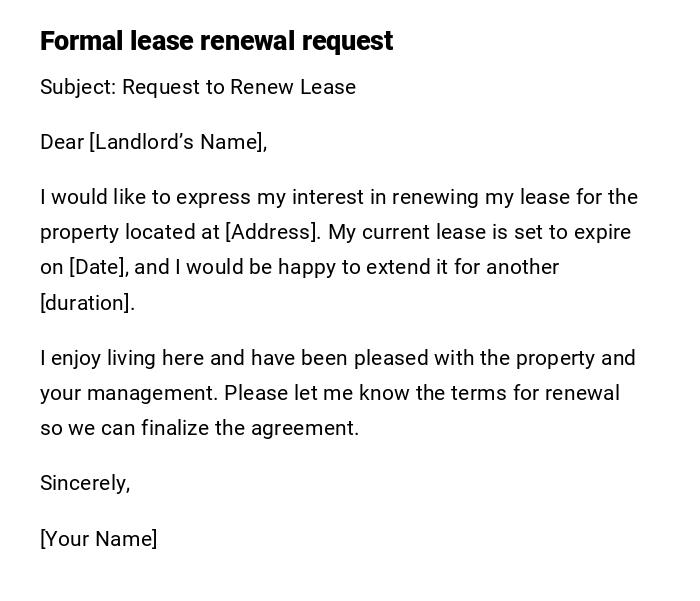
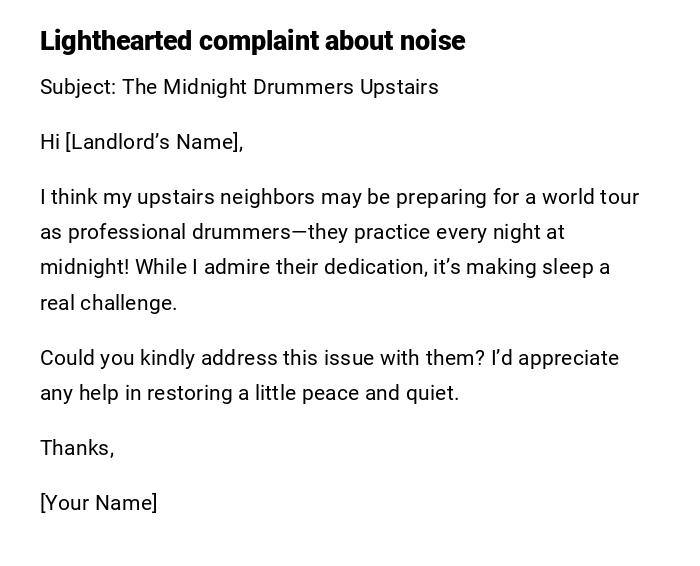
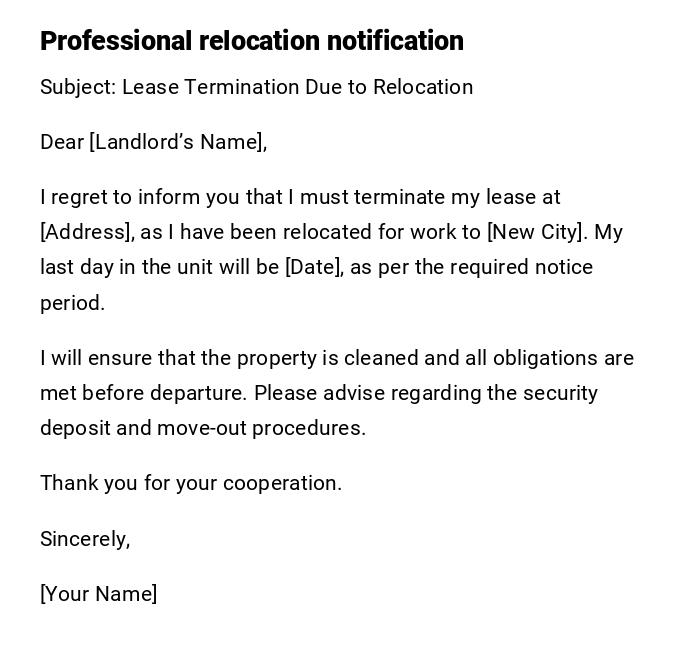
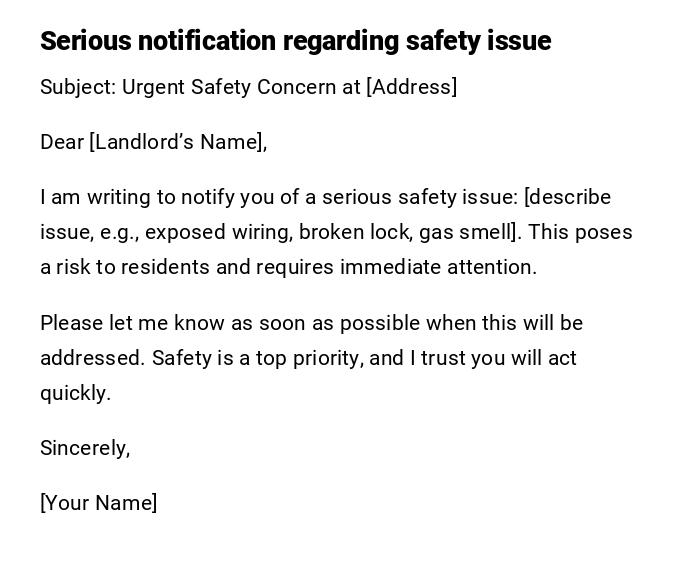

 Download Word Doc
Download Word Doc
 Download PDF
Download PDF